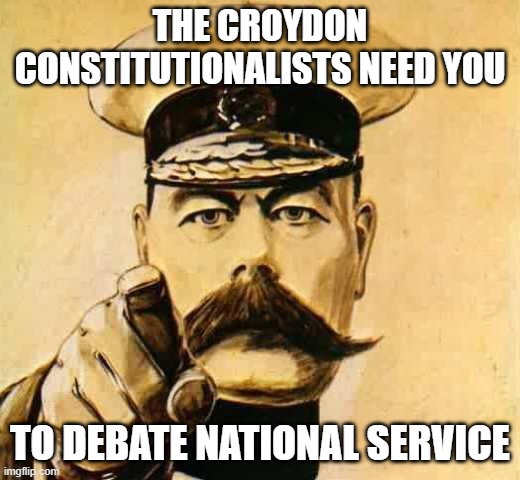Purley – Is it time to reintroduce National Service?
Croydon Constitutionalists discussed the recent statement by General Sir Patrick Sanders, head of the British army, that people must be prepared to support the armed forces by participating in a war if called upon to do so.
Recently General Sir Patrick Sanders, the head of the British Army, has said people must be prepared to support the armed forces by participating in a war if called upon to do so.
It’s time to ‘think the unthinkable’ and consider introducing conscription
Grant Shapps the Secretary of State for Defence said the world is “moving from a post-war to pre-war world” and urged for the UK to ensure its “entire defence ecosystem is ready” to defend its homeland, but Minister of State for the Armed Forces, James Heappey said of conscription “Nobody has ever mentioned it, nobody is even thinking about it. CGS didn’t say it. It is all nonsense.”
The Croydon Constitutionalists in our February meet-up discussed the topic ‘Is it time to reintroduce National Service’. We didn’t define what National Service might look like, rather leaving it open for discussion. The initial discussion was framed around National defence, Nation Building, Freedom, and Economics. Each topic was introduced with a few thoughts to kick things off. We then moved to a more general discussion.
National defence
We started with a few facts on the size of various militaries and the UK army. India has a total military of 5.1million people, China 4million, Russia 3.8million, United States 2million, France 0.38million and the UK 0.27million.
When the Berlin Wall fell, the British Army had 152,800 soldiers, Tony Blair’s government cut this to 110,000, David Cameron’s reduced it to 87,000, and there are credible reports the army could soon number just 67,800. The British Army is smaller than it has been at any point since the 1790s.
As possible pros and cons for the impact of National Service we said:
Pros
- War ultimately comes down to boots on the ground, and today we simply don’t have the numbers.
- National Service shows our enemy’s we have serious intent.
Cons
- Conscript armies are generally considered no good.
- It’s wasted spending which could be used on professional forces.
There was some questioning as to where the original proposals came from, why now, why talk of more wars. It was pointed out that whilst heads of the military would generally benefit from larger forces it is telling that no head of the armed forces have wanted this for years. Also, that we pride ourselves on having a professional armed forces. It was also asked, where we would get the people to train all these new recruits?
A question was also raised as to whether National Service would be security theatre rather than providing actual security. There was also a view that recent advertising for roles in the military doesn’t appeal to many of the people who are likely to join it, and this may be impacting numbers.
Nation Building
By far the liveliest discussions were on the topic of using National Service for nation building. We introduced this with the following possible Pros and Cons:
Pros
- Mixed groups of people from across the country could come together for maybe the first time.
- It will turn out British Citizens.
- It could be used as a possible path to citizenship.
Cons
- Might breed resentment in some communities.
- Why would people want to fight for a nation that doesn’t seem to like them.
It was pointed out there are many people, especially from London, who hadn’t seen much of the country, even if they had travelled the world. A stint in the armed forces might allow people to see and meet others from around the nation. Some felt Britain was no longer a nation and this could help build it. There was a lot of questions asked if we would want to teach some youngsters, who today carry knives, how to use guns.
We spoke about how in Israel the IDF uses service to build nationhood, and great tours of recruits can be seen in Jerusalem. We spoke about the historic county regiments, and how these worked well in being a source of pride to different areas of the country.
Economics
The cost of National Service is estimated at around £1.4billion per annum. Approximately 12.7 percent of people aged 16 to 24 were unemployed in the United Kingdom in July 2023, the highest of any age group. The government is expected to spend £130billion on non-pension and benefit. A small saving in this would easily pay for National Service.
The possible Pro was, ‘we have millions who never work, no one leaves the military without being able to read and write and without a skill’. The possible Con was, ‘the costs would be billions we don’t have’.
There was generally little concern about the costs of National Service although the question was raised what would be the cost finding and returning all the people who absconded or refused to serve.
Freedom
The possible Pro impact to freedom was to ask ‘how free you will be in a world dominated by Russia, and China’. The Con being ‘the state has no right to take your liberty and effort’.
One of the attendees asked how a government that can’t protect us with a professional army, would somehow be able to protect us with a conscript one. Generally, most of the room didn’t trust the government to protect our freedom today and wouldn’t accept them taking more of it.
General discussion
Some other considerations were introduced for the general discussion. We asked people to consider:
- Assuming we didn’t introduce full national service for all, we could make it an option from school e.g. at 16 you can become and apprentice, go to college or join the forces.
- We could recognise say 5 years in the forces as the equivalent to a degree for government jobs, or as a fast path route to police, other emergency and prison roles.
- We could withdraw out of work benefits from anyone in their 20s who hasn’t done service. Offer some stick and lots of carrot to increase numbers and help pull the nation together.
It was pointed out that these were all sensible suggestions but could be done without any forced conscription. It was also mentioned this would be doing the opposite of everything the country has been doing for 30 years.
We discussed how countries like Switzerland offers civilian service like heritage conservation as an alternative to serving in the military. It was suggested that people could do service in care homes, helping the elderly and disabled or in health service roles.
It was suggested that a kind of turbo charged Duke of Edinburgh award could be offered. There was some debate on if service requires some level of compulsion or people could be attracted to the roles by offering a salary.
We also spoke more generally about the role we ask the military to perform. The room had some support for making the UK a neutral state. There was also a general view, although far from supported by all, that we don’t have an obligation to help others. We spoke about some of the conflicts across the globe and possible future conflicts, as an example the room was divided in the desire to protect a country like Taiwan.
Summary
There were general concerns about the reintroduction of National Service, although the group did see some opportunities from it. It was clear many of those assembled had lost faith in our government and politicians of all stripes and were highly sceptical of any military entanglement the nation might get involved with.
Other activity at Croydon Constitutionalists
We have a new article on Live Facial Recognition asking is it a nightmare for criminals or for freedom? (Live Facial Recognition).
We have an intro this year’s election in the world’s largest democracy India (https://croydonconstitutionalists.uk/india-democracy/).
And we continue with our interviews of candidates for the next election, with interviews from candidates for the Libertarian Party (https://croydonconstitutionalists.uk/category/party/libertarian-party/), Reform (https://croydonconstitutionalists.uk/category/party/reform-brexit-party-party/) and the SDP (https://croydonconstitutionalists.uk/category/party/sdp/).

